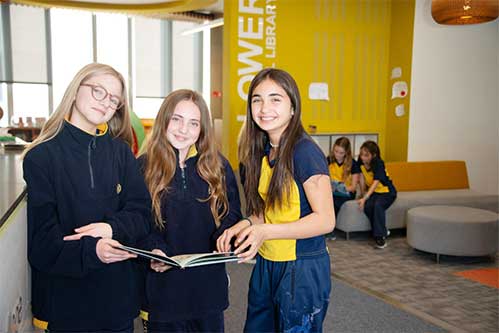

Santiago College es uno de los más de 5.900 colegios de 690 países que ofrecen programas curriculares del IB en todo el mundo, entregando una formación académica exigente desde la primera infancia hasta su graduación, centrada en el desarrollo de alumnos que continúen aprendiendo a lo largo de toda su vida y que construyan un mundo mejor a través del entendimiento y el respeto intercultural. Mediante prácticas docentes innovadoras, de alta calidad e inclusivas, se anima a los alumnos a pensar de forma crítica y a aprender más allá de las fronteras disciplinarias y culturales, desarrollando las habilidades que necesitan para prosperar en entornos educativos superiores y en su vida en general.
Los colegios del mundo del IB no sólo cumplen con estrictas normas para ser autorizados como tales, sino que también deben someterse a evaluaciones periódicas para garantizar que se mantienen los estándares y las prácticas del programa del IB. Esto permite que las universidades de todo el mundo reconozcan los diplomas del IB como prueba de los logros académicos, independientemente de la ubicación de su colegio, lo que permite a los alumnos de Santiago College acceder a instituciones de educación superior en una amplia variedad de países.
IB en Santiago College
Todos los alumnos de Santiago College participan en los tres programas IB:
• El Programa de la Escuela Primaria (PEP) (Infantil y Primaria)
• El Programa de los Años Intermedios (PAI) (Secundaria)
• El Programa del Diploma (PD) (Preparatoria)
Nuestra continuidad de programas del IB permite a todos nuestros alumnos participar en un proceso de aprendizaje unificado que los forma desde sus primeros años hasta su graduación. Los tres programas están diseñados para complementarse entre sí, lo que garantiza la coherencia, la consistencia y una filosofía educativa compartida, al tiempo que se respeta el proceso de desarrollo de los alumnos. La esencia transdisciplinaria del PEP, donde todo el aprendizaje se desarrolla bajo el paraguas de uno de los seis temas de investigación, alimenta la naturaleza interdisciplinaria del PAI, lo que proporciona a los alumnos una experiencia de la interconexión del conocimiento antes de sumergirse en las diferentes áreas disciplinarias. En nuestro colegio se espera que los alumnos sean agentes de su propio aprendizaje, desarrollando una comprensión conceptual transferible sobre el mundo que les rodea.
La participación en el Programa del Diploma del IB en el nivel de secundaria (Middle y High School) es obligatoria para todos los alumnos, dado que los requisitos de graduación incluyen la finalización de los requisitos del CAS, el curso de Teoría del Conocimiento del IB y la realización de un examen de inglés del IB. Los alumnos optan por realizar los exámenes completos del Diploma del IB, que se celebran en mayo para el 12º grado, y en este caso, también deben completar el requisito de la Monografía en una asignatura de su elección. Paralelamente al Programa del Diploma del IB, los alumnos de secundaria cumplen los requisitos del currículo nacional chileno y se preparan para los exámenes nacionales de acceso a la universidad chilena.
Asignaturas del Diploma IB que se ofrecen
Grupo 1 Estudios de Lengua y Literatura
IB Lengua y Literatura Inglesas HL y SL
IB Lengua y Cultura Inglesas SL
IB Lengua y Literatura Españolas HL y SL
Grupo 2 Adquisición de Lenguas
IB Inglés B HL
IB Español B HL
Grupo 3 Individuos y Sociedades
IB Historia HL y SL (en español)
IB Psicología HL y SL (en español)
Filosofía del IB en el nivel superior y el nivel estándar (en español)
Economía del IB en el nivel superior y el nivel estándar (en español)
Empresa y gestión del IB en el nivel superior y el nivel estándar (en inglés)
Sistemas medioambientales y sociedades del IB en el nivel estándar (en inglés)
Grupo 4 Ciencias
Biología IB HL y SL (en español)
Física IB HL y SL (en español)
IB Química SL (en español)
IB Sistemas Ambientales y Sociedades SL (en inglés)
Grupo 5 Matemáticas
IB Matemáticas Análisis y Enfoques HL y SL (en español)
IB Matemáticas Aplicaciones e Interpretaciones SL (en español)
Grupo 6 Artes
IB Música HL y SL (en español)
IB Teatro HL y SL (en español)
IB Artes Visuales HL y SL (en español)